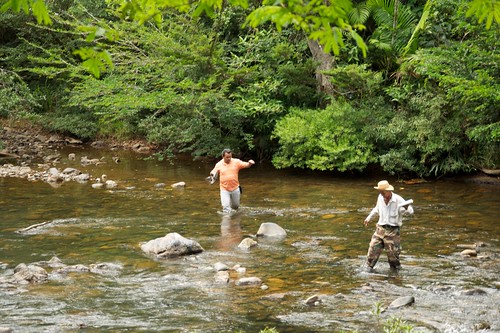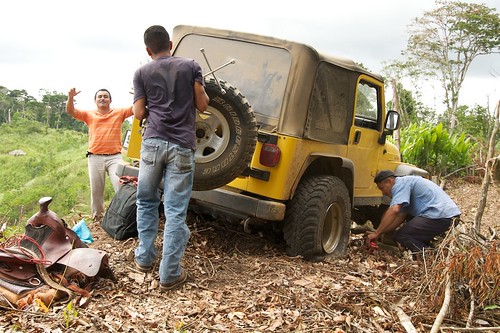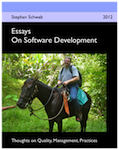Right of Possession and local authorities that fear to act
Before I start let’s make this perfectly clear. I am not a lawyer and everything I’m going to say in the following sentences is in no way meant as legal advice and expresses purely my very own personal point of view and opinion based on personal experience. Take it for what it’s worth but if you intent to do a land deal in Panama use your own legal advisor.
This is a follow-up on an earlier blog post titled Analysis of legal problems with Right of Possession in which I explained the background of the problem we ran into with the seller of a farm in rural Panama.
It turned out that we did not only ran into a problem with the seller but also with the very authorities that are supposed to govern land use in rural Panama.
Since December 2009 when we first retained a lawyer reforma agraria - that’s the authority governing land use - has been dragging its feet. They have confirmed and certified in writing that the seller in fact did pass his right of possession to us but they refused to provide the all so important certificate of right of possession. That certificate is the most important document of all because it allows you to proof to any other authority that you are the entitled user of the land.
The fact that reforma agraria did not want to follow the legal process established by law has created a void which the other party has been taking advantage of so far. We can only speculate about why that authority doesn’t want to finish the job. They have not told anybody why they don’t want to issue the certificate of right of possession neither have they refused it or expressed any type of concern. The answer simply has been that they don’t want to get involved in a conflict.
So … If the authority governing land use doesn’t want to get involved in a conflict, then how can such conflicts be solved? And why does the authority decide to do nothing? As elsewhere Panama has rules that require any authority to respond within a certain timeframe in writing to any request presented to them. That timeframe is 30 days. It came and went and we got no answer.
About two weeks back the regional director of reforma agraria went personally with us to the farm in order to conduct - again - a visual inspection. Back in June 2009 under a different administration this visual inspection was already done and a proper report was filed. But as we learned recently it was never signed by the regional director of reforma agraria of that time. Who knows why?
We were positive that the new director will figure it all out and by seeing the farm with his own eyes the case will be quickly resolved. Way wrong!
The day for the inspection came. We set our alarm clocks at 4 AM (two hours before sunrise) and arrived at 8:30 AM sharp at the offices of reforma agraria in Chepo to pick up the director as agreed upon the day before. To our surprise he wasn’t really ready to leave. First there were other things to do - which we accepted. Then the case file could not be found anywhere. How’s that? He scheduled a trip to the farm with us to conduct an official visual inspection and then the file cannot be found. That’s strange at best. We saw the director standing on a chair searching everywhere in several file drawers in his office for the file. After a while the search was extended to other offices and suddenly the file appeared. One can only guess why this file was found outside of the file drawer located in the director’s office. There was no reason for it to be elsewhere.
You might think that after all that we were ready to leave. To our surprise others in the office recommended with many words and gestures to the director that he should not go with us to conduct that inspection. “Don’t go with them. What if the other guy is there and shoots at you” and “Wait for the other guy. Both parties need to be there” were among the recommendations given by the other office workers to the regional director of reforma agraria. In the end he left with us and after a short visit to see the district administrator we were on our way to the farm. We learned later from the district administrator that the director spoke with him about the case and told him that he won’t go to the farm.
Well … He went with us to the farm. Here is a picture of Ingeniero Diomedes Pineda, current regional director of reforma agraria in Chepo, next to our neighbor Didimo studying the case file. They are both standing at the end of the road we built in front of the Chuluganti river. The farm is located on the other side of the river.
Initially he did not want to step onto the land of the farm in question but apparently after one of the guys from the nearby village who had worked for us building the road asked the director when he will be able to work permanently for us he changed his mind. We were advised to stay with the car and Sr. Pineda left with Didimo to check out the farm. They did not find anybody there, the little shed was as before and it was obvious that nobody lives there.
They did see about 30 to 40 heads of cattle which belong to someone else. The seller had signed a lease with someone else sometime in January and that person brought his animals to the farm in February. Apart from the fact that the seller passed on his right of possession to us in June 2009 and the fact that he was told by reforma agraria and by the district administrator (they met coincidentally in the village) that he is no longer the legal user of the land it is strictly forbidden by article 31 of the codigo agrario, that’s the law governing land use, to rent out land held under right of possession.
Speaking of codigo agrario. That whole right of possession thing is based on the social function the land should be used for. Article 30 states that for right of possession you need to meet one of the following criterias:
- there has to be pasture and at least one cattle per two hectareas of land
- 2/3 of the land has to be used for growing something
- 2/3 of the land has to be occupied by trees suitable for commercial logging </ul> The land in question did not had any cattle nor any kind of other agriculture going on when we were shown it first. According to the people in the village the seller had abandoned the land years ago. So based on the law the first visual inspection in June 2009 wasn't done right either. The guy who went there with us would have had to report that the land in question is abandoned and hence reforma agria would have had to invalidate any certificate of right of possession in the seller's name. That would have freed the land so that it can be assigned to anyone willing to work it as the law states. We did not know these details back then and as we know today the authority would not have acted anyhow. As you know by now they don't want to get involved into any conflict. After a while Didimo and Sr. Pinela returned. That day we were positive that this time we had met an upright gentleman who will execute the law as it is written and our problem will be solved shortly. After all he took off his shoes to cross the river and wanted to see for himself the land and what's going on there. On the way back to the village we got a flat tire and had to change it in the middle of our new road. Sr. Pinela is apparently enjoying his trip to the jungle with us. After a long day we took him back to the offices of reforma agraria and he told us that he will now sign the documents related to the visual inspection. He didn't want to say anything else but assured us that he will finish the rest with our lawyer. We drove home the usual 3 hours with good hopes that shortly we will be able to start working the land and realize all the projects we had planned for so long. Well ... After a few days our lawyer met with Sr. Pinela in his office and to our surprise he was not presented the certificate of right of possession in our name. He wasn't told either as to why Sr. Pinela did not want to issue that certificate. According to our lawyer there is nothing in the case file that would support this non-action. Our lawyer did, however, convince Sr. Pinela to provide him authenticated copies of those documents in which the former user of the land transfers his right of possession (we don't care about the issue of abandoned land at this point) to us. Together with these documents he received a certificate of right transfer (that's how it may be called in English) as proof that the transfer is correct, valid and legally binding. It looked very well at this point. Not exactly the end of the story but at least we had something in our hands that we can use at the corregiduria to request an order to the police to protect our rights. Based on the advice from our lawyer and with those documents we went first to the district administrator, who can act as a judge or advisor to the official at the corregiduria, to show him the documents. He studied them, concluded they were good, although not perfect, and sent us to the corregiduria in Canitas. There we requested that anybody occupying our land be removed and our rights be protected. The official studied the documents for a while and explained to us that she would have to review the contract between us and the seller again and decide whether she can issue such an order. Wait a minute ... The same lady had refused before to act based on the contract because it exceeds the $250 case value limit. Now with all those documents signed by the regional director of reforma agraria she wants to go back to the contract and review the case. We explained to her that those documents represent a decision and all she has to do it act upon it. In the end she insisted to speak the regional director of reforma agraria - apparently to verify that he in fact did sign the documents we presented. Sometime late in the afternoon we called her to learn what she had done. What a surprise! The regional director of reforma agraria, Sr. Pinela, explained to her on the phone that he did sign those documents but they weren't valid and not meant for such an action as we had requested. So she decided to not act at all and the person occupying and renting out our land is allowed again to take advantage of the void created by the authorities. As you can imagine our lawyer went ballistic after learning what Sr. Pinela told the corregidora. By now our case has been presented to the national director of reforma agraria. This is two steps away from the president of the Republic of Panama. To Panama direct foreign investment is very important and the current administration is not getting tired from talking about that in public. We learned from the newspaper that in another province (Veraguas) a lot of people have been evicted from land sold to foreign investors and President Martinelli himself ordered the eviction. The article in the newspaper did not provide any background details so we can only assume. From the context and based on comments by readers (the website of La Prensa allows readers to comment on news articles) it seems possible that there have been cases similar to ours as one commenter mentions that people have sold their right of possession and then erected shacks to pretend they were living there so that the other party cannot execute the right sold to them. The national director of reforma agraria has studied law and is a person prepared for such a job. The regional directors get their job based on political party membership and because their profession is somehow related to the topic but these people do not necessarily know the law. Personally I think that's a huge weakness of how Panama does business. A government institution such as reforma agraria exists to govern land use and to make sure that the law gets applied. That includes solving conflicts. How can the leader of such an institution be someone who doesn't have no experience in applying laws? It is to be expected that conflicts arise and the people are expected to have them solved by the authorities and not take matters in their own hands. We all hope that this case will get solved now. There is a number of Panamanian workers waiting for the project to get started. They have been doing some light stuff but if this drags along further, they will be without a job soon and others won't get a job because we cannot start farming. As it stands the inability of the local authorities to act has caused problems for the very people they should protect and serve. Foreign investors can easily take their money elsewhere. The locals cannot easily look for jobs elsewhere.
| Previous | 17 Mar 2010 | Next |
This article has been posted to social media sites. There might be comments. Just follow the links:











